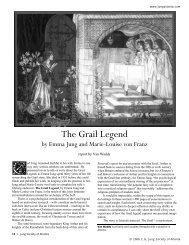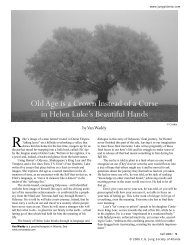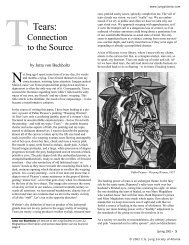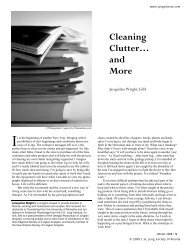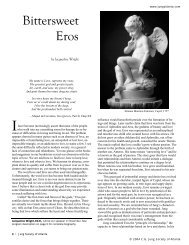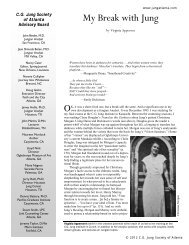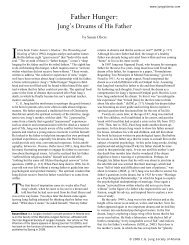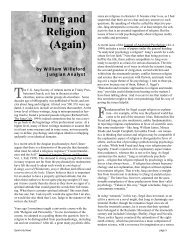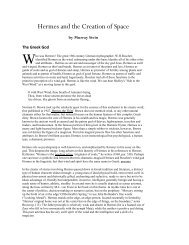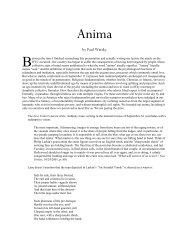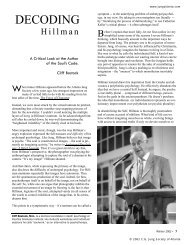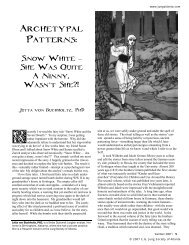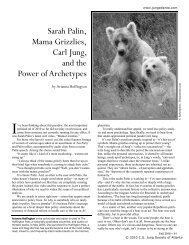Lucid Dreaming as a Marker of the Evolution - C.G. Jung Society of ...
Lucid Dreaming as a Marker of the Evolution - C.G. Jung Society of ...
Lucid Dreaming as a Marker of the Evolution - C.G. Jung Society of ...
You also want an ePaper? Increase the reach of your titles
YUMPU automatically turns print PDFs into web optimized ePapers that Google loves.
L<br />
ucid dreaming—<strong>the</strong> ability to recognize that an experience<br />
is a dream, ra<strong>the</strong>r than some sort <strong>of</strong> “strange”<br />
waking life event, while <strong>the</strong> dream is still in progress—<br />
h<strong>as</strong> always attracted particular attention in all <strong>the</strong> religious<br />
traditions <strong>of</strong> <strong>the</strong> world. Like <strong>the</strong> symbolic experience <strong>of</strong><br />
“vertical <strong>as</strong>cent” in a dream, lucid dreaming h<strong>as</strong> been <strong>as</strong>sociated<br />
with incre<strong>as</strong>ing spiritual awareness in virtually all <strong>the</strong><br />
world's religious traditions.<br />
The Tibetan Buddhist tradition in particular, h<strong>as</strong> valorized<br />
<strong>the</strong> ability to distinguish dreaming from regular waking experience,<br />
on a regular b<strong>as</strong>is while still remaining <strong>as</strong>leep, <strong>as</strong> <strong>the</strong><br />
primary “spiritual skill” necessary to transcend <strong>the</strong> terrors and<br />
seductions <strong>of</strong> <strong>the</strong> “after death world,” (known <strong>as</strong> <strong>the</strong> “Bardo<br />
Thodol,” <strong>the</strong> “Bardo <strong>of</strong> Dying and Becoming”). The Tibetan<br />
Buddhists maintain that <strong>the</strong> ability to dream lucidly while alive<br />
and in <strong>the</strong> body prepares <strong>the</strong> individual to achieve <strong>the</strong> highest<br />
spiritual goal that any human can attain—i.e. postponing <strong>the</strong><br />
personal achievement <strong>of</strong> Nirvana, and instead consciously and<br />
comp<strong>as</strong>sionately choosing a particular reincarnation that will<br />
contribute to <strong>the</strong> “relief <strong>of</strong> <strong>the</strong> suffering <strong>of</strong> all sentient beings,”<br />
ra<strong>the</strong>r than being driven to reincarnate by escalating fear engendered<br />
by <strong>the</strong> “nightmare” <strong>of</strong> <strong>the</strong> Bardo world, (<strong>as</strong> <strong>the</strong>y believe<br />
virtually all o<strong>the</strong>r human beings are). Those who are able to<br />
accomplish this state <strong>of</strong> lucid awareness in <strong>the</strong> after-deathbefore-rebirth<br />
Bardo world are known <strong>as</strong> “bodhisattv<strong>as</strong>”—that<br />
is to say, “future Buddh<strong>as</strong>” or “Buddh<strong>as</strong> in training.”<br />
Although <strong>Jung</strong> declared fairly early in his career that what<br />
we know <strong>as</strong> lucid dreaming w<strong>as</strong> “an impossibility,” his later<br />
encounter with <strong>the</strong> Tibetan Buddhist tradition, and with his own<br />
incre<strong>as</strong>ingly lucid dreams, opened his mind fur<strong>the</strong>r to this<br />
extraordinary state <strong>of</strong> awareness. Those <strong>of</strong> us who do dream<br />
work with clients and patients will almost certainly have encountered<br />
<strong>the</strong>ir lucid dreams, (to say nothing <strong>of</strong> our own), <strong>as</strong> <strong>the</strong><br />
dream world reflects incre<strong>as</strong>ingly successful achievement <strong>of</strong><br />
Reverend Jeremy Taylor, D.Min. C<strong>of</strong>ounder and P<strong>as</strong>t President <strong>of</strong><br />
<strong>the</strong> International Association for <strong>the</strong> Study <strong>of</strong> Dreams, (IASD), &<br />
Founder-Director <strong>of</strong> <strong>the</strong> Marin Institute for Projective Dream Work,<br />
(MIPD).<br />
8 • <strong>Jung</strong> <strong>Society</strong> <strong>of</strong> Atlanta<br />
www.jungatlanta.com<br />
<strong>Lucid</strong> <strong>Dreaming</strong> <strong>as</strong> a <strong>Marker</strong> <strong>of</strong> <strong>the</strong> <strong>Evolution</strong> <strong>of</strong> Consciousness<br />
by Jeremy Taylor, D.Min.<br />
spiritual health and emotional wholeness. My own experience<br />
suggests that lucid dreaming is clearly on <strong>the</strong> rise among <strong>the</strong><br />
incre<strong>as</strong>ingly open, curious, and self-aware dreamers with whom<br />
I work.<br />
At <strong>the</strong> moment, <strong>the</strong> current definition <strong>of</strong> lucid dreaming<br />
employed by academic and laboratory researchers emph<strong>as</strong>izes<br />
<strong>the</strong> appearance <strong>of</strong> <strong>the</strong> word “dream” and <strong>the</strong> dreamer's narrative.<br />
In order for a dream narrative to meet <strong>the</strong> current criteria<br />
<strong>of</strong> lucidity, <strong>the</strong> dream ego must articulate <strong>the</strong> clear thought:<br />
“this is a dream…,” or “I am dreaming…,” in order for <strong>the</strong><br />
dream to be considered fully lucid. Any dreams that exhibit any<br />
lucid attributes without this clear linguistic marker are generally<br />
categorized and discussed <strong>as</strong> “pre-lucid.”<br />
I have become incre<strong>as</strong>ingly convinced over <strong>the</strong> l<strong>as</strong>t couple<br />
<strong>of</strong> decades that this definition is limiting and fundamentally<br />
flawed, and is in fact blocking <strong>the</strong> path to a deeper understanding<br />
and appreciation <strong>of</strong> <strong>the</strong> natural, collective evolutionary<br />
implications <strong>of</strong> lucid dreaming.<br />
Any image or element that appears in <strong>the</strong> narrative <strong>of</strong> a<br />
remembered dream, attains that status <strong>of</strong> memorability <strong>as</strong> a<br />
direct result <strong>of</strong> <strong>the</strong> totality <strong>of</strong> <strong>as</strong>sociations that it carries. There<br />
are <strong>of</strong> course, all <strong>the</strong> personal <strong>as</strong>sociations (both conscious and<br />
unconscious) that <strong>the</strong> individual brings and attaches to that<br />
element—and in addition <strong>the</strong>re are all <strong>the</strong> collective, cultural,<br />
archetypal <strong>as</strong>sociations and implications that inhere in that<br />
image or element—whe<strong>the</strong>r or not <strong>the</strong> dreamer is directly aware<br />
<strong>of</strong> <strong>the</strong>m upon awakening. Perhaps <strong>the</strong> most important piece <strong>of</strong><br />
evidence that <strong>the</strong> archetypes are real, (ra<strong>the</strong>r than mere intellectual<br />
constructions), is that dreamers with no previous conscious<br />
exposure to <strong>the</strong> idea <strong>of</strong> archetypes or archetypal images regularly<br />
dream <strong>the</strong>m—and exhibit “aha’s” <strong>of</strong> recognition when<br />
<strong>the</strong>se archetypal <strong>as</strong>sociations and implications are pointed out<br />
and articulated.<br />
Since this is <strong>the</strong> c<strong>as</strong>e across <strong>the</strong> board, it seems to me that<br />
this principle <strong>of</strong> “totality <strong>of</strong> <strong>as</strong>sociation” must also be applied to<br />
<strong>the</strong> word “dream,” particularly <strong>as</strong> it appears <strong>as</strong> <strong>the</strong> primary<br />
marker for dreaming lucidity—and this is where <strong>the</strong> problem<br />
arises: to call someone “a dreamer” in ordinary conversation,<br />
(and not just in <strong>the</strong> Romance and Germanic languages), is not a<br />
compliment. It implies a weakness <strong>of</strong> intellect and a counter-<br />
© Dundanim, Dreamstime.com<br />
© 2010 C.G. <strong>Jung</strong> <strong>Society</strong> <strong>of</strong> Atlanta
productive unwillingness to face “<strong>the</strong> cold, hard facts” <strong>of</strong> reality<br />
by an irresponsible escape into bootless fant<strong>as</strong>y. This negative,<br />
disparaging implication is inherent in <strong>the</strong> word “dream” itself,<br />
and for this re<strong>as</strong>on it is (unconsciously and inevitably) built into<br />
<strong>the</strong> current accepted definition <strong>of</strong> lucid dreaming itself.<br />
A second, inescapable implication <strong>of</strong> <strong>the</strong> totality <strong>of</strong> <strong>as</strong>sociations<br />
carried inherently by <strong>the</strong> word “dream,” particularly <strong>as</strong><br />
it applies to <strong>the</strong> technical definition <strong>of</strong> lucid dreaming, is that<br />
<strong>the</strong>re are “two worlds”—<strong>the</strong> real world, and <strong>the</strong> dream world.<br />
As we know from all our dealings with unconscious material,<br />
<strong>the</strong> fact that we don't intend such <strong>as</strong>sociations does not prevent<br />
<strong>the</strong>m from being present, and playing crucially important,<br />
determining roles. The sole reliance on <strong>the</strong> appearance <strong>of</strong> some<br />
form <strong>of</strong> <strong>the</strong> word “dream” <strong>as</strong> <strong>the</strong> primary marker for lucid<br />
dreaming h<strong>as</strong> tended to diminish <strong>the</strong> importance <strong>of</strong> dreams<br />
<strong>the</strong>mselves (in <strong>the</strong> inevitable contr<strong>as</strong>t it calls up to <strong>the</strong> real<br />
world). This disparaging contr<strong>as</strong>t between “real” (serious,<br />
important, and mature) and “dream” (frivolous, unimportant,<br />
and childlike) tends to obscure one <strong>of</strong> <strong>the</strong> more important<br />
evolutionary developments that I believe lucid dreaming itself<br />
naturally tends to promote.<br />
M<br />
y own lucid dreams, and <strong>the</strong> lucid dreams <strong>of</strong> my<br />
dream work clients, incre<strong>as</strong>ingly impress me <strong>as</strong><br />
being directed toward evolving <strong>the</strong> understanding<br />
that we do not live in “two worlds,” (e.g. <strong>the</strong> “real,” “serious,”<br />
and “important” world <strong>of</strong> waking life, and <strong>the</strong> “unreal,”<br />
“frivolous,” and “relatively unimportant” world <strong>of</strong> <strong>the</strong> dream),<br />
but ra<strong>the</strong>r that we live in one world—unus mundus—a single<br />
world which we experience and apprehend in deep and important<br />
ways both in <strong>the</strong> waking state and <strong>the</strong> dream state.<br />
For <strong>the</strong>se re<strong>as</strong>ons, it seems to me that <strong>the</strong> time h<strong>as</strong> come to<br />
expand our definition <strong>of</strong> “lucid dreaming,” and to shift our<br />
attention from <strong>the</strong> appearance <strong>of</strong> <strong>the</strong> word “dream” in <strong>the</strong> narrative,<br />
and begin to pay more attention to <strong>the</strong> full range <strong>of</strong><br />
thoughts, feelings, and behaviors <strong>of</strong> <strong>the</strong> dream ego in <strong>the</strong> dream.<br />
I would place <strong>the</strong> appearance <strong>of</strong> spontaneous, conscious realizations<br />
<strong>of</strong> <strong>the</strong> symbolic connections between dream experience<br />
and waking life in <strong>the</strong> midst <strong>of</strong> <strong>the</strong> dream itself high on this list<br />
<strong>of</strong> criteria defining evolving lucidity in dreams.<br />
Let me <strong>of</strong>fer what I believe to be such an evolving “lucid<br />
moment” in a recent dream <strong>of</strong> mine, <strong>as</strong> a c<strong>as</strong>e in point. In <strong>the</strong><br />
dream, dream-ego-me is moved to jump <strong>of</strong>f a ferryboat into <strong>the</strong><br />
frigid waters <strong>of</strong> Puget Sound to rescue a woman who appears to<br />
be attempting suicide by drowning. Once I am in <strong>the</strong> water, I<br />
see that she is actively and purposefully swimming downward<br />
into <strong>the</strong> depths. I swim down after her and realize quite quickly<br />
that I have begun to brea<strong>the</strong> e<strong>as</strong>ily and deeply, even though I<br />
am under <strong>the</strong> water. At this moment in <strong>the</strong> dream, I have <strong>the</strong><br />
clear thought that, “this must mean that my efforts to face and<br />
experience more consciously <strong>the</strong> deep fears that I repressed <strong>as</strong> a<br />
boy must be meeting with some success, or else this wouldn't<br />
be happening…”<br />
This thought in <strong>the</strong> dream is born <strong>of</strong> my waking life experience<br />
<strong>as</strong> a dream worker that “water” in dreams is very <strong>of</strong>ten<br />
<strong>as</strong>sociated with feeling and emotion. When a dreamer is<br />
“underwater” and “drowning,” it is most <strong>of</strong>ten a symbolic<br />
indicator that in waking life <strong>the</strong> dreamer is being overwhelmed<br />
by strong emotion. When that same dreamer is “underwater”<br />
and suddenly discovers that he or she is able to “brea<strong>the</strong>,” it is a<br />
very reliable archetypal indicator <strong>of</strong> that person's evolving<br />
emotional maturity; “<strong>the</strong> waters <strong>of</strong> emotion” in which <strong>the</strong><br />
www.jungatlanta.com<br />
dreamer “drowned” before are just <strong>as</strong> deep and potentially overwhelming<br />
<strong>as</strong> <strong>the</strong>y always were, but <strong>the</strong> dreamer h<strong>as</strong> developed<br />
sufficient emotional maturity to experience and negotiate <strong>the</strong>se<br />
emotions and to “brea<strong>the</strong> underwater” without fear, panic, or<br />
denial.<br />
In this dream, <strong>the</strong>re is no conscious thought, “I am breathing<br />
underwater—this must be a dream…”; <strong>the</strong>re is only a conscious<br />
appreciation <strong>of</strong> <strong>the</strong> symbolic implication <strong>of</strong> <strong>the</strong> act <strong>of</strong> “breathing<br />
underwater” in relation to my current waking life efforts to<br />
reevaluate my conscious understanding <strong>of</strong> my complex, less-than<br />
-fully-conscious memories <strong>of</strong> my childhood. It is an experience<br />
<strong>of</strong> unus mundus—<strong>the</strong> one world that I/we live in, dreaming and<br />
awake. To me this is not a “pre-lucid dream”—it is a lucid dream<br />
evolving beyond <strong>the</strong> limitations <strong>of</strong> dependency on language that<br />
is already supposedly fully known and understood.<br />
If we can say anything with certainty about <strong>the</strong> dream world,<br />
it must be that it is a revelation <strong>of</strong> mystery—mystery which is<br />
never fully revealed to consciousness, no matter how deep our<br />
conscious explorations and understandings go - because, <strong>as</strong><br />
Sandor Ferenczi pointed out, “dreams are <strong>the</strong> workshop <strong>of</strong> evolution,”<br />
and <strong>the</strong> work <strong>of</strong> evolution continues in all <strong>of</strong> us.<br />
<strong>Lucid</strong> dreaming itself is a natural, archetypal, symbolic<br />
reflection <strong>of</strong> <strong>the</strong> evolution <strong>of</strong> consciousness in every individual<br />
dreamer who experiences it. As that evolution continues, <strong>the</strong><br />
dreamer's understanding and use <strong>of</strong> language also evolves. At<br />
some point, <strong>the</strong> word “dream” (because <strong>of</strong> <strong>the</strong> multiple ambiguous<br />
and even negative <strong>as</strong>sociations that carries from earlier states<br />
<strong>of</strong> consciousness) begins to dissolve into a more direct experience<br />
<strong>of</strong> <strong>the</strong> one world we live in, both consciously and unconsciously,<br />
all <strong>the</strong> time.<br />
Just <strong>as</strong> <strong>Jung</strong>'s understanding <strong>of</strong> lucid dreaming evolved over<br />
<strong>the</strong> course <strong>of</strong> his career, our own conscious understanding <strong>of</strong> <strong>the</strong><br />
nature and implications <strong>of</strong> our own lucid dreaming should also<br />
develop and mature to reflect <strong>the</strong> development <strong>of</strong> our own incre<strong>as</strong>ing<br />
self-awareness, individually and collectively. In order to<br />
do this, we must be prepared to re-examine and revise even our<br />
most b<strong>as</strong>ic definitions—even at <strong>the</strong> risk <strong>of</strong> being labeled <strong>as</strong><br />
“revisionists.”<br />
© Dundanim, Dreamstime.com<br />
Winter 2010 • 9<br />
© 2010 C.G. <strong>Jung</strong> <strong>Society</strong> <strong>of</strong> Atlanta



